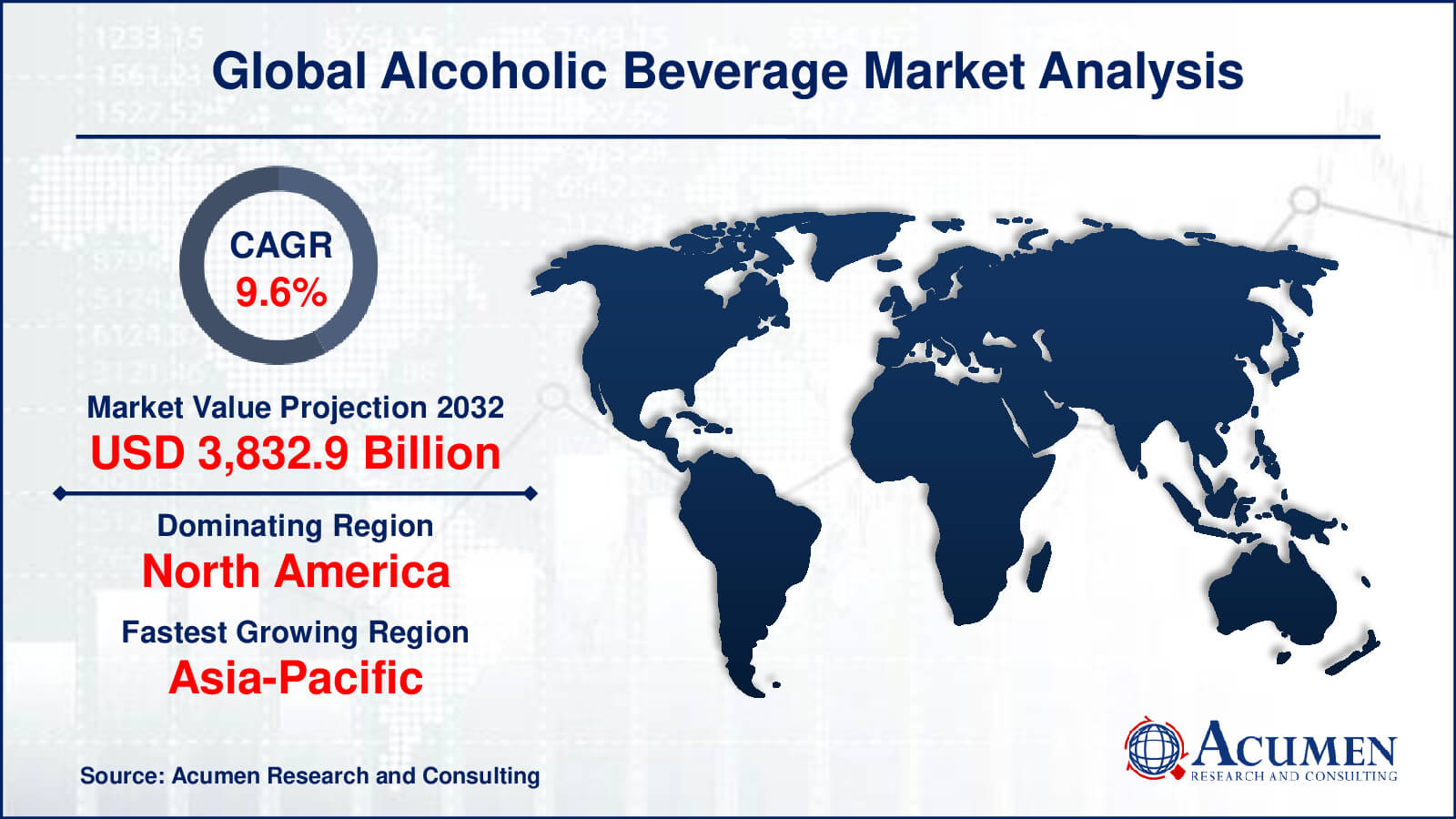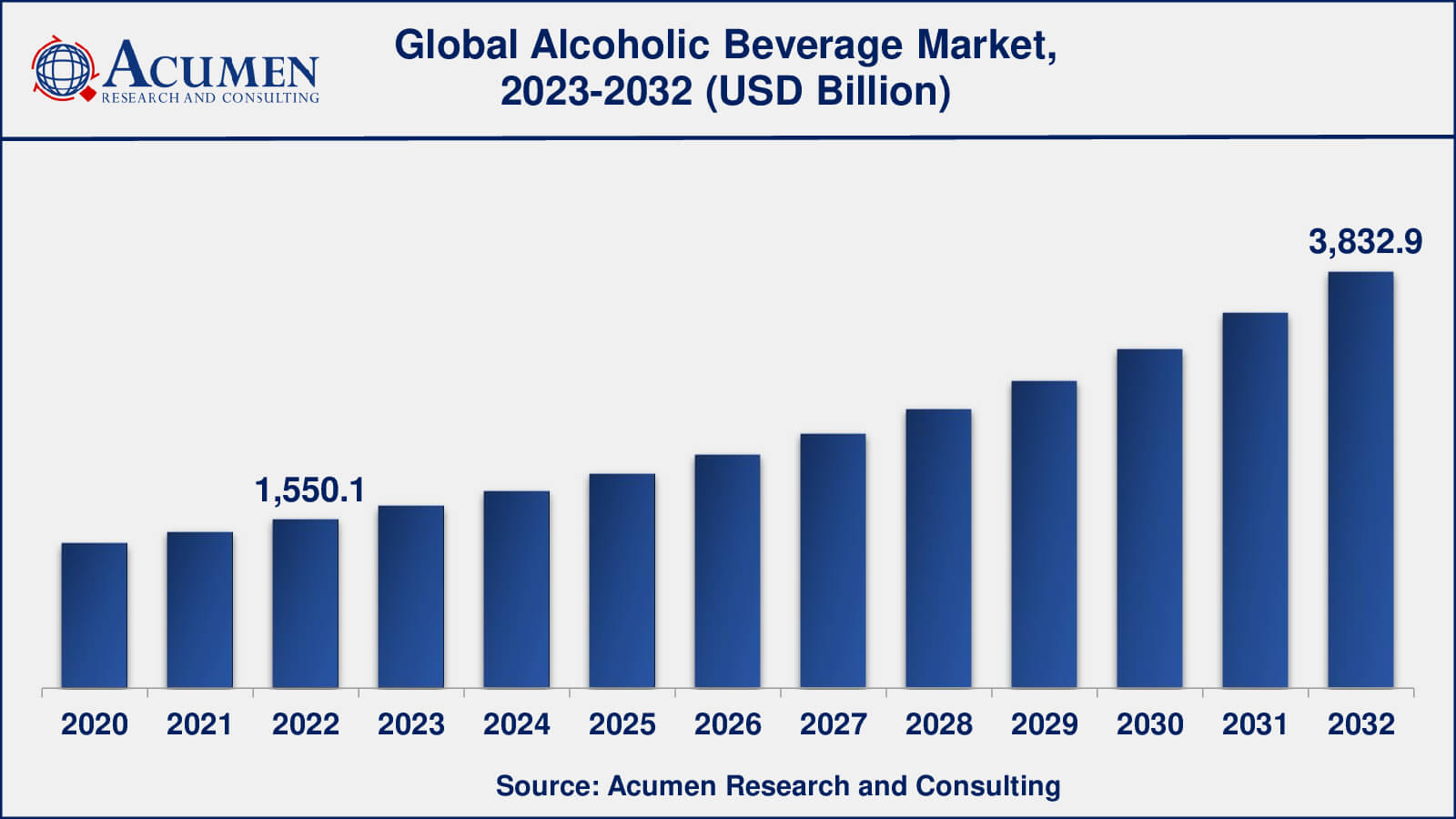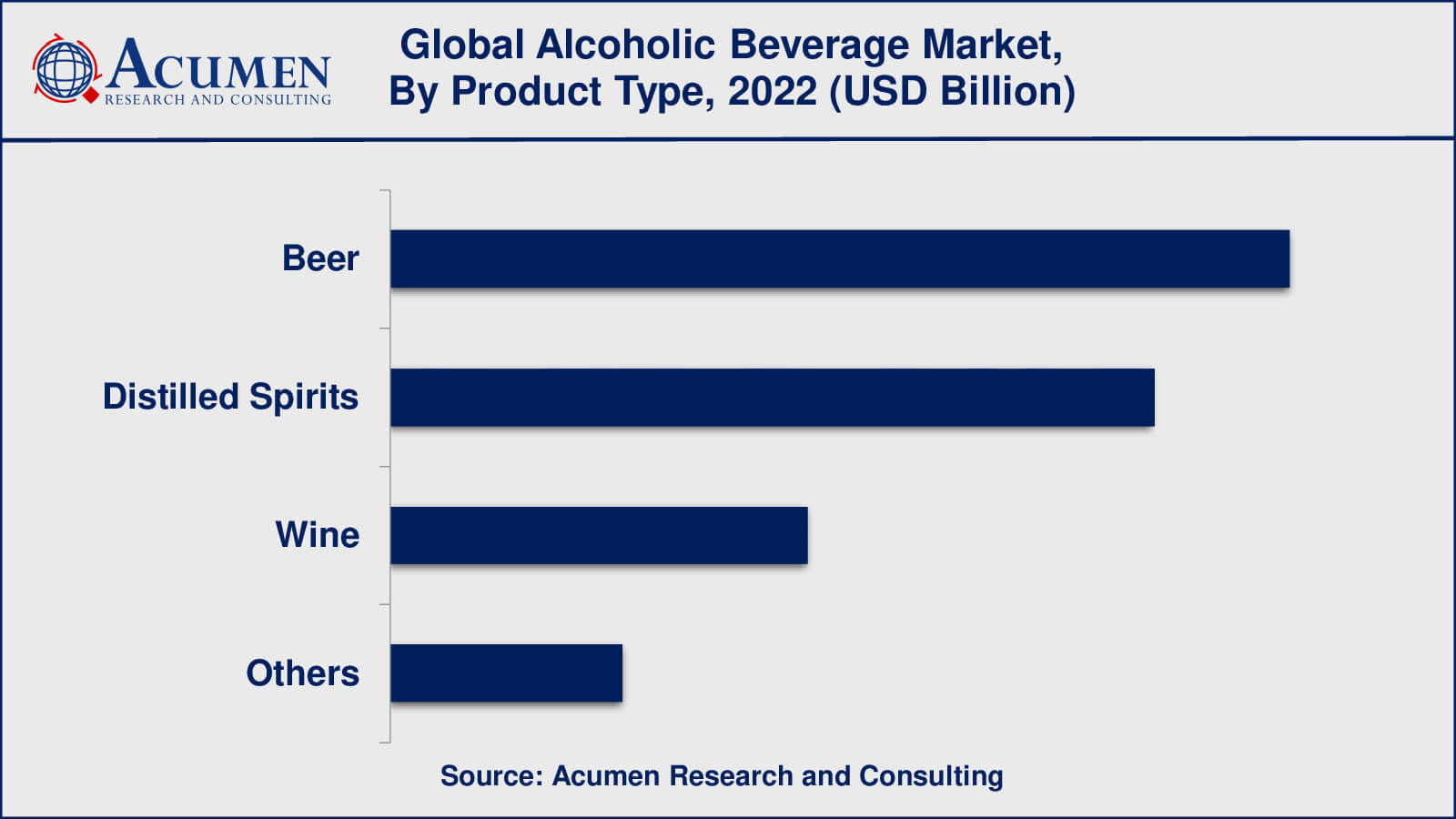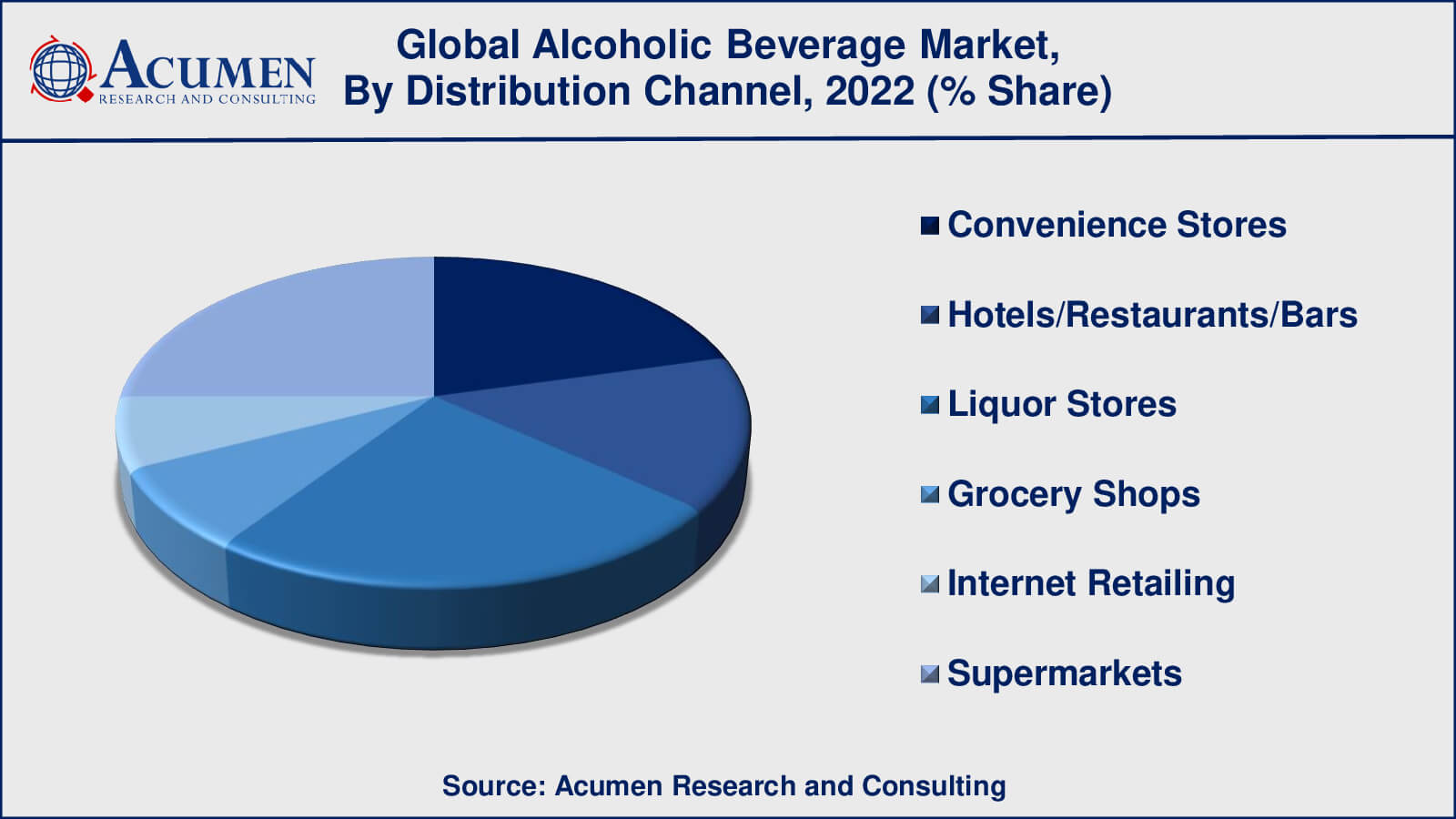Alcoholic Beverage Market Size - Global Industry, Share, Analysis, Trends and Forecast 2023 - 2032
Published :
Report ID:
Pages :
Format :
Alcoholic Beverage Market Size - Global Industry, Share, Analysis, Trends and Forecast 2023 - 2032
Report Coverage
- Industry Dynamics
- Market Size and Forecast Data
- Segment Analysis
- Competitive Landscape
- Regional Analysis with a Niche Focus on Country-Level Data
- High Level Analysis - Porter's, PESTEL, Value Chain, etc.
- Company Profiles of Key Players
- Option to Customize the Report As Per Your Specific Need
Request Sample Report
The Alcoholic Beverage Market Size collected USD 1,550.1 Billion in 2022 and is set to achieve a market size of USD 3,832.9 Billion in 2032 growing at a CAGR of 9.6% from 2023 to 2032.
Alcoholic Beverage Market Report Statistics
- Global alcoholic beverage market revenue is estimated to reach USD 3,832.9 billion by 2032 with a CAGR of 9.6% from 2023 to 2032
- North America alcoholic beverage market value occupied more than USD 511.5 billion in 2022
- Asia-Pacific alcoholic beverage market growth will record a CAGR of over 9% from 2023 to 2032
- Among product type, the Beer sub-segment generated around 39% share in 2022
- Based on distribution channel, the liquor stores generated more than US $ 370 billion revenue in 2022
- Increasing demand for ready-to-drink cocktails is a popular alcoholic beverage market trend that fuels the industry demand

An alcoholic beverage is an alcoholic drink that contains a considerable amount of alcohol (formally known as ethanol) in it. The alcoholic beverage market across the globe is expected to witness moderate growth during the forecast period. Rising demand for different types of alcoholic beverages across various emerging countries owing to their large consumer base coupled with increasing disposable income and growing consumption of alcohol by the population of various age groups supports the market growth. To provide a detailed analysis of the market, the global alcoholic beverage market can be segmented based on product type, distribution channel, and geography. Based on product type, the market has been classified into beer, wine, and spirits. On the other hand, depending on the point of sale, various distribution channels include supermarkets and hypermarkets, specialist retailers and convenience stores, and others. Geographically, the global alcoholic beverage market can be segmented into North America, Europe, Asia-Pacific, Middle-East and Africa (MEA), and Latin America

Global Alcoholic Beverage Market Dynamics
Market Drivers
- Growing popularity of craft beer, spirits and wine
- Increasing consumer disposable income
- Consumer preferences and trends
Market Restraints
- Rising health concerns
- Strict government regulations
Market Opportunities
- Rise of online sales
- Expansion into emerging markets
Alcoholic Beverage Market Report Coverage
| Market | Alcoholic Beverage Market |
| Alcoholic Beverage Market Size 2022 | USD 1,550.1 Billion |
| Alcoholic Beverage Market Forecast 2032 | USD 3,832.9 Billion |
| Alcoholic Beverage Market CAGR During 2023 - 2032 | 9.6% |
| Alcoholic Beverage Market Analysis Period | 2020 - 2032 |
| Alcoholic Beverage Market Base Year | 2022 |
| Alcoholic Beverage Market Forecast Data | 2023 - 2032 |
| Segments Covered | By Product Type, By Packaging, By Distribution Channel, And By Geography |
| Regional Scope | North America, Europe, Asia Pacific, Latin America, and Middle East & Africa |
| Key Companies Profiled | Anheuser-Busch, Bacardi Limited, Constellation Brands Inc., Molson Coors Brewing Co., Accolade Wines, Diageo Plc, Carlsberg, Heineken, Pernod Ricard SA, United Spirits Ltd., and SABMiller. |
| Report Coverage |
Market Trends, Drivers, Restraints, Competitive Analysis, Player Profiling, Covid-19 Analysis, Regulation Analysis |
Alcoholic Beverage Market Growth Factors
Increasing urbanization in combination with growing disposable incomes of the middle-class population owing to rapid economic development across the globe are the primary factors predicted to drive the demand for alcoholic beverages in the coming years. Moreover, owing to the rising frequency of celebration coupled with the increasing influence of western culture, alcoholic beverage is becoming an integral part of celebration and parties. This, in turn, is predicted to trigger the demand for alcoholic beverages during the forecast period. On the other hand, increasing consumption of super premium and premium alcoholic beverages is also expected to fuel the growth of the alcoholic beverages market, in terms of value. The demand for craft beer is predicted to witness promising growth in the coming years. On the other hand, in the past few years, the demand for flavored alcoholic beverages is showing stable growth.
However, the rising rate of taxation on alcoholic beverages is one of the major restraining factors predicted to deter the growth of the alcoholic beverage market. Moreover, restriction on the promotion and advertisement of alcoholic beverages is also anticipated to limit the growth of the market. Alcoholic beverages are available in a variety of flavors in the market across the globe. Consumers who have newly become legally eligible for purchasing alcoholic beverages are considered the most prospective buyers of different categories of alcoholic beverages. These customers are not taste or brand loyal, rather they want varieties in their drink options. Thus, they form an important market segment on the basis of their age
Alcoholic Beverage Market Segmentation
The worldwide alcoholic beverage market is categorized based on product type, packaging, distribution channel, and geography.
Alcoholic Beverage Market By Product Type
- Beer
- Ale
- Lager
- Hybrid
- Wine
- Sparkling
- Fortified
- Others
- Distilled Spirits
- Rum
- Whiskey
- Vodka
- Others
- Others

According to the alcoholic beverage market forecast, beer has been the most dominant product type in the alcoholic beverage market, accounting for a significant share of total alcohol consumption worldwide. This is because beer is a widely used beverage and frequently costs less than wine and alcoholic beverages. However, since consumers want for premium and high-quality items, the wine and spirits categories have grown in popularity recently, especially in developed nations. Due to the growing popularity of wine culture, rising wine consumption in emerging economies and the tendency toward premiumization, the wine market has been expanding. With the demand for premium and craft whisky rising globally, whisky has been a particularly good performer in the distilled spirits sector. In some markets, other spirits like vodka, gin, and rum have also experienced growth, particularly with the development of craft and artisanal distilleries.
Alcoholic Beverage Market By Packaging
- Plastic Bottles
- Glass Bottles
- Tins
According to an alcoholic beverage industry analysis, glass bottles have been the most dominant packaging type in the alcoholic beverage market, accounting for a significant share of total alcoholic beverage packaging. Because glass bottles are perceived as high-quality and are frequently used for premium and luxury products, they are a popular packaging choice for alcoholic beverages. Furthermore, because glass is a highly recyclable material, it is a sustainable choice for packaging. Plastic bottles and tins have also become popular for alcoholic beverages, particularly beer and ready-to-drink cocktails. Because plastic bottles are lightweight and shatterproof, they are an ideal choice for outdoor and on-the-go consumption. Tins, on the other hand, are frequently used for beer and other canned beverages because they are lightweight and easily recyclable.
Alcoholic Beverage Market By Distribution Channel
- Convenience Stores
- Hotels/Restaurants/Bars
- Liquor Stores
- Grocery Shops
- Internet Retailing
- Supermarkets

Liquor stores have traditionally been the most dominant distribution channel in the alcoholic beverage market, accounting for a sizable portion of total alcoholic beverage sales. Liquor stores, which are often dedicated to the sale of alcoholic beverages, typically offer a wide variety of alcoholic beverages, including beer, wine, and spirits. They frequently have knowledgeable employees who can assist customers with purchasing decisions, and they may also offer special promotions and discounts. Nevertheless, other distribution channels for alcoholic beverages, such as supermarkets, grocery stores, and convenience stores, have also been widely used. Supermarkets and grocery stores typically sell a variety of alcoholic beverages, such as beer, wine, and spirits, in addition to other products, whereas convenience stores typically sell a more limited selection of alcoholic drinks for on-the-go consumption.
Alcoholic Beverage Market Regional Outlook
North America
- U.S.
- Canada
Europe
- U.K.
- Germany
- France
- Spain
- Rest of Europe
Asia-Pacific
- India
- Japan
- China
- Australia
- South Korea
- Rest of Asia-Pacific
Latin America
- Brazil
- Mexico
- Rest of Latin America
The Middle East & Africa
- South Africa
- GCC Countries
- Rest of the Middle East & Africa (ME&A)
Alcoholic Beverage Market Regional Analysis
Across various regions, North America held the largest market share in the alcoholic beverages market and is expected to maintain its dominance. The United States is the region's largest market, with high per capita consumption and a growing trend toward premium and craft products.
The European alcoholic beverages market is also mature, with wine and beer consumption dominating. France, Italy, Spain, and Germany are major wine-producing and consuming nations, while the United Kingdom is a significant beer and spirits market.
The Asia-Pacific alcoholic beverages market is expanding, with a shift toward premium and high-quality products. China and Japan are the region's largest markets, with significant growth in the wine and spirits categories. Furthermore, due to rising alcoholic beverage consumption in African countries, the Middle-East and Africa (MEA) region is expected to grow rapidly in the coming years.
Alcoholic Beverage Market Players
Some of the global alcoholic beverage companies profiled in the report include Anheuser-Busch, Bacardi Limited, Constellation Brands Inc., Molson Coors Brewing Co., Accolade Wines, Diageo Plc, Carlsberg, Heineken, Pernod Ricard SA, United Spirits Ltd., and SABMiller.
Frequently Asked Questions
How big is the alcoholic beverage market?
The alcoholic beverage market size was USD 1,550.1 Billion in 2022.
What is the CAGR of the global alcoholic beverage market during forecast period of 2023 to 2032?
The CAGR of alcoholic beverage market is 9.6% during the analysis period of 2023 to 2032.
Which are the key players operating in the market?
The key players operating in the global market are Anheuser-Busch, Bacardi Limited, Constellation Brands Inc., Molson Coors Brewing Co., Accolade Wines, Diageo Plc, Carlsberg, Heineken, Pernod Ricard SA, United Spirits Ltd., and SABMiller.
Which region held the dominating position in the global alcoholic beverage market?
North America held the dominating position in alcoholic beverage market during the analysis period of 2023 to 2032.
Which region registered the fastest growing CAGR for the forecast period of 2023 to 2032?
Asia-Pacific region exhibited fastest growing CAGR for alcoholic beverage market during the analysis period of 2023 to 2032.
What are the current trends and dynamics in the global alcoholic beverage market?
The current trends and dynamics in the alcoholic beverage industry include growing popularity of craft beer, spirits and wine, increasing consumer disposable income, and consumer preferences and trends.
Which product type held the maximum share in 2022?
The beer product type held the maximum share of the alcoholic beverage market.



